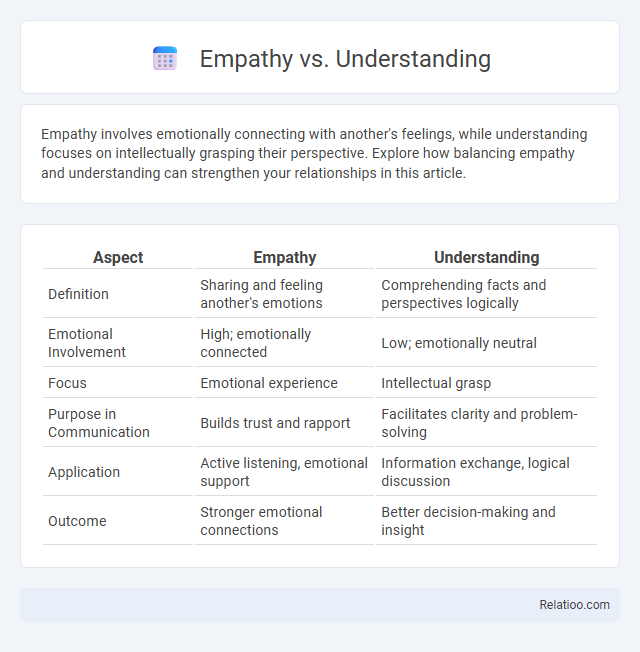Empathy involves emotionally connecting with another's feelings, while understanding focuses on intellectually grasping their perspective. Explore how balancing empathy and understanding can strengthen your relationships in this article.
Table of Comparison
| Aspect | Empathy | Understanding |
|---|---|---|
| Definition | Sharing and feeling another's emotions | Comprehending facts and perspectives logically |
| Emotional Involvement | High; emotionally connected | Low; emotionally neutral |
| Focus | Emotional experience | Intellectual grasp |
| Purpose in Communication | Builds trust and rapport | Facilitates clarity and problem-solving |
| Application | Active listening, emotional support | Information exchange, logical discussion |
| Outcome | Stronger emotional connections | Better decision-making and insight |
Defining Empathy and Understanding
Empathy involves the ability to emotionally resonate with another person's feelings, allowing an individual to experience someone else's emotions firsthand. Understanding refers to the cognitive process of comprehending another person's perspective or situation without necessarily sharing their emotional state. While empathy requires sharing emotions, understanding centers on intellectual recognition and interpretation of experiences.
The Core Differences Between Empathy and Understanding
Empathy involves feeling and sharing another person's emotions, allowing you to connect deeply with their experience, while understanding is the cognitive ability to comprehend their situation or perspective without necessarily sharing the emotional aspect. The core difference lies in empathy's emotional resonance versus understanding's intellectual grasp, enabling you to respond with compassion or insight accordingly. Recognizing this distinction enhances communication, fostering both emotional support and clear comprehension in your interactions.
Psychological Foundations of Empathy
Empathy involves the ability to share and resonate with another person's emotions, rooted in mirror neuron activity and affective neuroscience. Understanding refers to cognitive processes that allow one to intellectually grasp another's perspective or situation without necessarily experiencing their feelings. The psychological foundations of empathy encompass both affective empathy--emotional sharing--and cognitive empathy, highlighting the integral role of theory of mind in differentiating emotional resonance from intellectual comprehension.
The Role of Understanding in Communication
Understanding plays a crucial role in communication by enabling you to accurately interpret and respond to others' messages. Unlike empathy, which involves sharing feelings, understanding centers on grasping the meaning and intent behind words, ensuring clarity and reducing miscommunication. Mastering this skill enhances your ability to connect effectively and build trust in both personal and professional interactions.
Empathy vs Understanding: Real-Life Examples
Empathy involves emotionally resonating with another person's feelings, such as comforting a grieving friend by sharing their sorrow, while understanding requires intellectually grasping their situation without necessarily sharing the emotions, like analyzing the reasons behind a friend's loss. For instance, in a workplace conflict, empathy allows a manager to feel an employee's frustration, fostering trust, whereas understanding enables the manager to comprehend the conflict's root cause to find a solution. Real-life examples highlight empathy's role in building emotional connections and understanding's importance in problem-solving and effective communication.
Benefits of Practicing Empathy
Practicing empathy enhances your interpersonal relationships by fostering genuine connections and improving communication through deeper emotional awareness. Empathy allows you to recognize and share the feelings of others, leading to increased trust and collaboration in both personal and professional settings. Unlike simple understanding or sympathy, empathy drives compassionate actions that promote conflict resolution and emotional support.
Importance of Understanding in Conflict Resolution
Understanding plays a critical role in conflict resolution by fostering genuine comprehension of differing perspectives and underlying emotions. While empathy involves sharing feelings and sympathy focuses on concern, understanding enables parties to grasp the root causes of disagreements, facilitating effective communication and cooperation. This deep cognitive connection helps transform conflicts into opportunities for mutual respect and lasting solutions.
Challenges in Balancing Empathy and Understanding
Balancing empathy and understanding often challenges individuals as empathy requires emotionally connecting with others' feelings, while understanding demands cognitive processing of their perspectives. Excessive empathy can lead to emotional burnout or bias, compromising objective understanding, whereas overemphasis on understanding may hinder emotional resonance and compassionate responses. Navigating these dynamics requires cultivating emotional intelligence and mindful awareness to maintain healthy interpersonal relationships and effective communication.
Developing Empathy and Understanding Skills
Developing empathy and understanding skills enhances your ability to connect deeply with others by recognizing their emotions and perspectives without judgment. Empathy involves feeling what others feel, while understanding focuses on cognitive insight into their experiences and motivations. Strengthening these skills fosters meaningful relationships, effective communication, and emotional intelligence, essential for both personal growth and professional success.
Empathy and Understanding in Building Healthy Relationships
Empathy involves feeling and sharing another person's emotions, while understanding refers to intellectually comprehending their perspective and experiences. Building healthy relationships requires blending empathy and understanding to foster trust, compassion, and effective communication. When you practice both, you create a supportive environment that strengthens emotional connections and resolves conflicts more peacefully.

Infographic: Empathy vs Understanding
 relatioo.com
relatioo.com